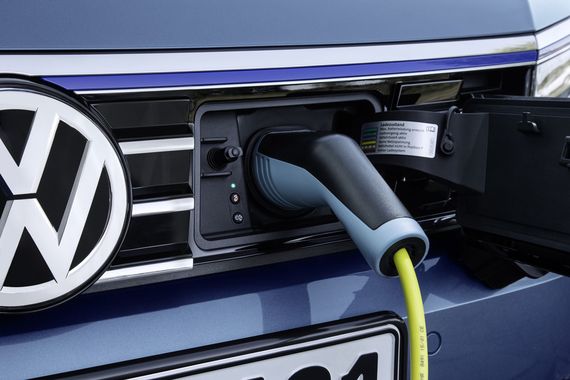On the face of it, the revelation that 500,000 VW cars in the United States were designed to cheat on diesel emissions testing doesn't seem like good news for air quality. And, sadly, it seems VW was not the only culprit -- a new study by Transport and Environment shows that nearly every European automaker has cheated on the diesel emission requirements.
But since 2015, when Volkswagen admitted to using a "defeat device" to circumvent US emissions regulations, a remarkable series of events has rapidly pushed electric vehicle (EV) technology to the fore in Europe. In fact, what has become known as "Dieselgate" may end up being a turning point globally in combatting both toxic and greenhouse gas emissions from automobiles.
Europeans drive a lot of diesel cars. About 50% of cars on the road there are diesel. In the United States, that number is about 3% - almost all of which are European. Why the disparity?
Diesel got a huge push in Europe after the 1997 Kyoto accord on climate change. The emissions coming out of cars was an easy target to reduce greenhouse gases. With advances in fuel injection and turbocharging, diesel engines grew quieter, delivered generous torque and produced about 20% fewer greenhouse gases.
In 1998, the European Union and its domestic automakers agreed on a set of goals. Essentially, European car manufacturers would invest in diesel engines that could meet certain GHG performance standards while governments subsidized diesel through lower taxes. The result was a rapid shift to more diesels. In 1997, about 22% of new car registrations in Western Europe were for diesel cars. By 2007 that number had more than doubled.
The German auto industry was a key player in this, not only in advancing diesel technology but in making it "respectable" across vehicle segments. It was no longer that only a taxi ran on diesel, but a Mercedes S class or BMW 7 series, the "status" cars for the German senior executive, had turbocharged diesel powertrains that were virtually as quiet and smooth as gasoline engine versions. That meant diesel was for everyone.
For years, Europe was in love with the diesel car across the continent. Today, Europe's all-in investment in diesel has some obvious problems. Diesel may be more efficient than gas but it produces a lot more of the noxious gases linked to smog and toxic particulates causing serious health effects from emphysema, asthma to premature deaths. The serious air pollution in Paris, London, Berlin and other European cities is evidence of this.
And, the reductions in greenhouse gas emissions that diesel offers won't get us anywhere near the new international goals to limit the impacts of climate change. Furthermore, it is also becoming increasingly more expensive to meet the new European nitrous oxide (NoX) and particulate emissions standards for diesel engines starting in 2020 and competitors like Renault are cutting back on diesels. After the emissions scandal, Volkswagen can no longer claim "clean diesel" as a brand position nor as a viable solution to meeting current emissions standards much less tighter future standards. Moving back to gasoline engines offers no pathway to meeting the future standards and would be a step backwards. The only solution left is electrification.
So, VW, the world's largest auto manufacturer has announced that it is charting a bold new course. By 2025, VW has announced that 20-25 percent of its unit sales will be electric. That's around 2.5 million vehicles per year. Recently, at the Paris Motor Show, Volkswagen unveiled its new all-electric, fully autonomous concept car, the I.D. It is due to go on sale in 2020, with a range of up to 373 miles. Audi, VW's luxury division, separately announced that it will hold to the same ratio, and will be producing nearly half a million electric luxury cars to compete with Tesla by 2025. Porsche, another VW Group company, is also working an all electric Tesla competitor for around 2020.
VW, Audi and Porsche are not the only European companies moving rapidly into electrification. Mercedes reportedly has plans to introduce at least ten EVs between 2018 and 2025 and is targeting as much as 20% of Mercedes's worldwide sales by 2025 to be electric. BMW, the other German luxury carmakers was already ahead of the pack with its 'i" series electric vehicles which it launched in 2013 and is certain be a vital part of the emerging German electrification competition.
To meet the climate goals agreed to at the Paris Climate Accord, we need at least 150 million 100% electric vehicles on the road by 2030, up from today's number of 1.7 million. Historically, when the German auto industry decides to pivot on a strategy, they do it with speed, innovation and then execute it very effectively. The prestige German cars carry around the world stand to make electric vehicles not only more prolific, but also more desirable. So, the new, German EV race is truly welcome news.
Perhaps history will remember "Dieselgate" for igniting the German industry's full-scale entry into the electric vehicle race and nudging us further towards the tipping point of an EV dominated future. Whatever history writes in the end, the good news is that it is happening just at the right time and for the benefit of the planet.
And perhaps most noteworthy is the fact that the chances for an "EVgate" in the future are unlikely as EVs' zero tailpipe emissions preclude cheating on emissions. And that is good news for industry and regulators, alike.

